See also
- Purple Rain (disambiguation)
- Purple Reign in Blood , 2005 album by Fenix*TX
Purple Reign is a mixtape by Future.
Purple Reign may also refer to:
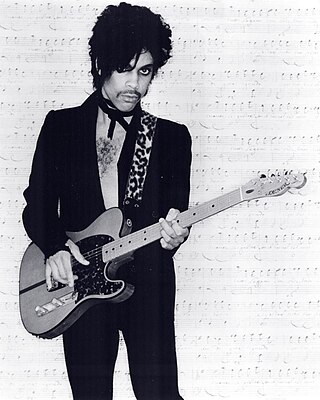
Prince Rogers Nelson was an American singer, multi-instrumentalist, songwriter, record producer, and actor. The recipient of numerous awards and nominations, he is regarded as one of the world's greatest musicians. He was known for his flamboyant, androgynous persona; his wide vocal range, which included a far-reaching falsetto and high-pitched screams; and his skill as a multi-instrumentalist, often preferring to play all or most of the instruments on his recordings. His music incorporated a wide variety of styles, including funk, R&B, rock, new wave, soul, synth-pop, pop, jazz, blues, and hip hop. Prince produced his albums himself, pioneering the Minneapolis sound.
Purple Rain may refer to:

Purple Rain is a 1984 American romantic rock musical drama film scored by and starring Prince in his acting debut. Developed to showcase his talents, it contains several concert sequences, featuring Prince and his band The Revolution. The film is directed by Albert Magnoli, who later became Prince's manager, from a screenplay by Magnoli and William Blinn. The cast also features Apollonia Kotero, Morris Day, Olga Karlatos and Clarence Williams III.
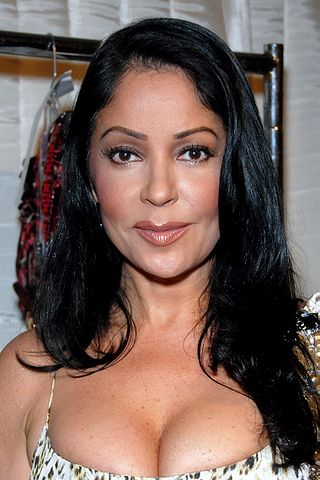
Patricia Apollonia Kotero is an American actress, songwriter, singer, producer, director, podcast host and former model. She is known for co-starring in Prince's 1984 film Purple Rain and for having been the lead singer of the girl group Apollonia 6.
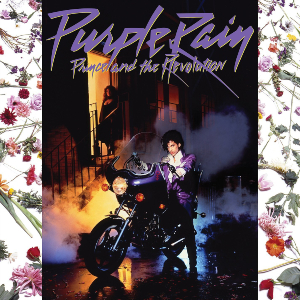
Purple Rain is the sixth studio album by the American singer, songwriter, producer, and multi-instrumentalist Prince. It was released on June 25, 1984, by Warner Bros. Records as the soundtrack album to the 1984 film of the same name. Purple Rain was musically denser than Prince's previous albums, emphasizing full band performances, and multiple layers of guitars, keyboards, electronic synthesizer effects, drum machines, and other instruments.

"When Doves Cry" is a song by American musician Prince, and the lead single from his sixth studio album Purple Rain. According to the DVD commentary of the film Purple Rain (1984), Prince was asked by director Albert Magnoli to write a song to match the theme of a particular segment of the film that involved intermingled parental difficulties and a love affair. The next morning, Prince had composed two songs, one of which was "When Doves Cry". According to Prince's biographer Per Nilsen, the song was inspired by his relationship with Vanity 6 member Susan Moonsie.
Skyman may refer to:
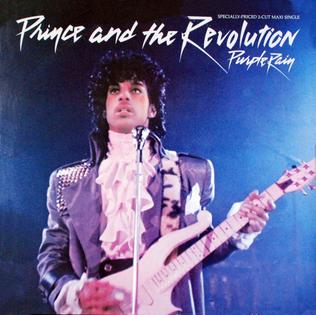
"Purple Rain" is a song by the American musician Prince and his backing band the Revolution. It is the title track from the 1984 album of the same name, which in turn is the soundtrack album for the 1984 film of the same name starring Prince, and was released as the third single from the album. The song is a power ballad that combines rock, R&B, gospel, and orchestral music.

The Revolution is an American band formed in Minneapolis, Minnesota, in 1979 by Prince, serving as his live band and later as his studio band. The band's sound incorporated rock, pop, R&B, funk, new wave and psychedelic elements. Along with Prince's other projects, the Revolution helped create the Minneapolis sound. By the time of their 1986 breakup, the Revolution had backed Prince on two studio albums, two soundtracks and two videos.

"Let's Go Crazy" is a 1984 song by Prince and The Revolution, from the album Purple Rain. It is the opening track on both the album and the film Purple Rain. "Let's Go Crazy" was one of Prince's most popular songs, and was a staple for concert performances, often segueing into other hits. When released as a single, the song became Prince's second number-one hit on the Billboard Hot 100, and also topped the two component charts, the Hot R&B/Hip-Hop Songs and Hot Dance Club Play charts, as well as becoming a UK Top 10 hit. The B-side was the lyrically controversial "Erotic City". In the UK, the song was released as a double A-side with "Take Me with U".

"Purple Medley" is a medley of songs by American musician Prince from 1995. There is no album accompanying the single. The track is a mix of many hits and well-known songs from Prince's career. Some of the pieces of music are samples, while others are re-recorded for the mix. Some of the additional instrumentation is credited to The New Power Generation. The "Purple Medley" consists of snippets from the songs: "Batdance", "When Doves Cry", "Kiss", "Erotic City", "Darling Nikki", "1999", "Baby I'm a Star", "Diamonds and Pearls", "Purple Rain" and "Let's Go Crazy" and fades for the edit. The full version continues with "Sexy Dancer", "Let's Work", "Irresistible Bitch", "I Wanna Be Your Lover", "Alphabet St.", "Thieves in the Temple", the bassline to The Time's "777-9311", Sheila E.'s "A Love Bizarre", "If I Was Your Girlfriend", "Raspberry Beret", "Little Red Corvette", "Cream" and "Peach".
"Darling Nikki" is a song produced, arranged, composed, and performed by American musician Prince, originally released on his sixth studio album Purple Rain (1984). Though the song was not released as a single, it gained wide notoriety after Tipper Gore pointed out its sexual lyrics—in particular an explicit reference to female masturbation—and was partly responsible for the creation of the infamous Parental Advisory sticker. The song tells the story of a "sex fiend" named Nikki who seduces the singer.
Caballero, the Spanish word for horseman, knight or gentleman, may be used as a form of address gentlemen and may refer to:
"The Beautiful Ones" is the third track on Prince and the Revolution's soundtrack album Purple Rain. It was one of three songs produced, arranged, composed, and performed by Prince, the other two being "When Doves Cry" and "Darling Nikki". The song was recorded at Sunset Sound in Los Angeles by Peggy Mac and David Leonard on September 20, 1983. The song replaced "Electric Intercourse" on the Purple Rain album.
The Purple Rain Tour was a concert tour by American recording artist Prince and the Revolution following up on the success of his sixth studio album Purple Rain and his 1984 film Purple Rain. According to Spin, the tour sold over 1.7 million tickets.
Rain City may refer to the following cities:
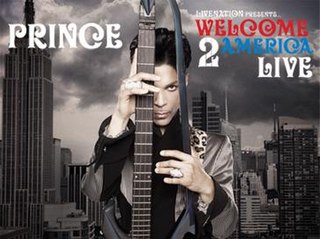
Welcome 2 was a concert tour by American recording artist Prince. Playing over 80 shows, the tour reached North America, Europe, and Australia. Each leg of the tour was branded with the "Welcome 2" title followed by the continent in which the leg was located. The tour marked the singer's first performances in North America in over six years. The show was composed of the singer performing his hits with his band The New Power Generation. Alongside Prince, various musicians performed including Janelle Monáe, Esperanza Spalding, and Cassandra Wilson. The tour placed 39th on Pollstar's "Top 50 Worldwide Tour", earning nearly $20 million.1

The Rain City Superhero Movement was a Seattle-based organization active in the U.S. state of Washington between 2011 and 2014. It was composed of costumed activists who describe themselves as a crime-fighting brigade. Witnesses have reported that the group has intervened in crimes on several occasions, while the police maintained they would prefer that individuals other than sworn officers not place themselves in danger, and act as good witnesses instead.
The Piano & a Microphone Tour was the final concert tour by American recording artist Prince. In a December 2015 interview in anticipation of the tour, he said that "I'm doing it to challenge myself, I won't know what songs I'm going to do when I go on stage. I won't have to, because I won't have a band". It was ultimately Prince's final tour due to his sudden death from a fentanyl overdose on April 21, 2016, one week after the last tour date.
Purple Reign is a tribute show featuring the music of Prince. It has been performed mainly at casinos in the Las Vegas area. Jason Tenner produces and stars in the show.